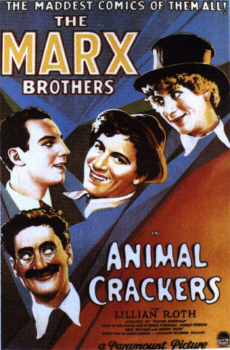|
“Animal Crackers,” . By Dan Gheno |
 |
|
, |
|
“Animal Crackers,” . By Dan Gheno |
 |
|
, |
When asked if he would like to write for the Marx Brothers, Pulitzer playwright George S. Kaufman muttered, “I’d as soon write for the Barbary Apes.”
Despite this intransigent attitude, Kaufman finally broke down and wrote two very successful Broadway plays for them, Cocoanuts and Animal Crackers. Both of these plays were converted into the profitable silver screen format, the latter now playing at the Magic Lantern.
For both Kaufman and his part-time collaborator, Morrie Ryskind, it was heart-rending to watch the Marx Brothers brutally deface the script with improvised jokes and extraneous skits. But the rewards were great, both financially and artistically. Kaufman later said he learned a valuable lesson from the brothers — how to let go of jokes that don’t work.
While “Animal Crackers” was still on the road, Ryskind sat in the audience and noted which jokes garnered the least guffaws. Ryskind then pruned these from the script, when he adapted it for Paramount films in 1930.
The excised dialogue did little damage to plot continuity, since there was little continuity to begin with. Basically, the plot is: Groucho, Harpo, Chico and Zeppo are invited to a dowager’s large mansion for the weekend. As you might expect, the brothers are not the gentile socialites she thought she had invited. During the course of the movie, a priceless painting is stolen, launching all the characters into a counter-productive manhunt.
Much of the unaltered material from Animal Crackers became trademarks for the brothers. “Hooray for Captain Spaulding,” which Groucho sang early in the movie, became the theme song for “You Bet Your Life,” Groucho’s classic TV show.
But many of the memorable hits were born from simple ‘mistakes or practical jokes. Once, when Chico forgot how to stop his musical number, he continued playing on and on, until Groucho saved him with a wise-crack. Harpo’s girl-chasing began when he tried interrupting one of Groucho’s monologues by paying a dancer to run across the stage while he chased her and honked his horn.
It was because of this ribald atmosphere that Paramount forced Lillian Roth to play the movie’s token damsel in distress as punishment for giving C. B. DeMille trouble. Even though she was an alcoholic, her grudging performance was no worse than the exaggerated Shakespearian gestures that the other straight actors offered.
Although Roth and her romantic lead, Hal Thompson, were useless meat to director Victor Heerman, at least they were there when he needed them. Heerman had such a hard time keeping all the brothers inside the studio, he finally, built four small cells on the sound stage and he chained them in.
Likewise, Kaufman treated them with an iron fist in the early days of the Broadway play. But he also found time to socialize with then, especially Harpo. Kaufman was the perfect foil for Harpo’s tricks, since he was a very polite man who was easily embarrassed.
One time, when they were eating in a ritzy restaurant, Harpo seized a check from a nearby table, put salt and pepper on and ate it. Another time, some of Kaufman’s boring friends were lingering at his house, obviously fishing for a dinner invitation. Sensing Kaufman’s plight, Harpo put on an apron, which he doused with ketchup, and re-entered the living room. “I’ve killed one of the cats, Ma’m, but I haven’t been able to catch the other one. Do you think one will be enough for dinner?”
But just because Harpo was heartless when it came to putting other people on the spot, it doesn’t mean he wasn’t easily embarrassed himself. In the opening scene of Animal Crackers, Harpo comes on stage and the butler takes his coat, simultaneously removing his pants and leaving a pair of swimming trunks exposed.
However, one night, Harpo accidentally walked on stage, with nothing but a G-string. Extremely red-faced, Harpo fled and wasn’t easily consoled for days. Groucho snapped, as the curtain fell, “Tomorrow night, he’s not going to wear anything. Get your tickets early.”
People often complained that Zeppo somehow didn’t fit into this raucous setting. And finally, after a string of movies in which his roles kept shrinking and shrinking, until he started having serious doubts about himself Zeppo decided to quit. Nonetheless, many people in the know feel that Zeppo was the funniest of the four in real life.
In fact, when Groucho took ill for a week, Zeppo played Captain Spaulding and performed it to his brother’s highest expectations, delivering all the gestures and nuances that the comedic role demanded.
Both Zeppo and Kaufman were quiet fellows, who frequently kept to themselves. Yet, without them, Animal Crackers would not be the long-lasting classic it is, after 47 years. Indeed, Kaufman’s death almost spelled the end of Animal Crackers itself. It took 18 years to resolve his will and reassign his residuals so that the movie could be re-released.
If Kaufman were still alive, be might comment that the lawyers who held up the movie, were more like Barbary Apes than even the Marx Brothers.
| 20th Century Mass Media Writings |
| Dan Gheno Painting and Drawing Home Page |